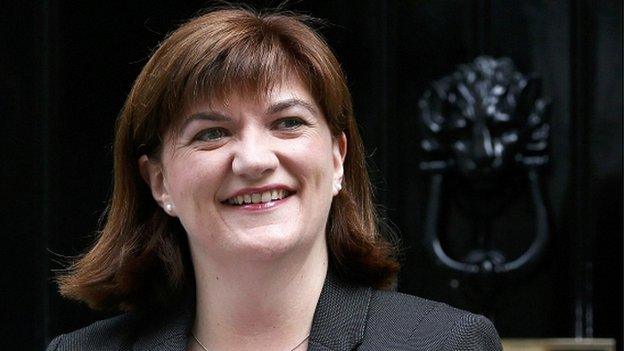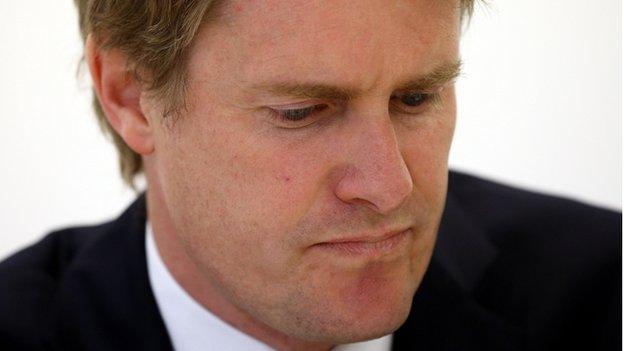Queen's Speech: Intervention for 'coasting' schools
- Published

Nicky Morgan's next term will see a further increase in academies
Underperforming schools in England will face a more rapid intervention, under plans announced in the Queen's Speech.
The government's proposed legislation will mean that more schools are likely to become academies.
An education bill will target so-called "coasting" schools which have shown a "prolonged period of mediocre performance".
Labour's Tristram Hunt said a more pressing issue for school standards was "the quality of classroom teaching".
Head teachers' leaders warned that such "structural changes" would be irrelevant unless the government addressed a "looming crisis in both funding and recruitment".
More academies
The next phase of the government's plans for education will see an accelerated targeting of struggling schools in England and changing their leadership.
The Education and Adoption Bill announced in the Queen's Speech will give extra powers to regional school commissioners to bring in "leadership support" from other high-achieving schools and to "speed up the process of turning schools into academies".

Tristram Hunt says there needs to be a stronger focus on teaching standards
For schools that are rated as "inadequate" by inspectors, "barriers would be removed" for a rapid conversion into an academy.
The emphasis has been on so-called "coasting schools".
These are described as having "mediocre performance" and "insufficient pupil progress", but a specific definition of what constitutes a coasting school has still be be published.
Malcolm Trobe, deputy head of the ASCL head teachers' union, accused the Education Bill of remaining "silent" on the practical issues facing schools - such as a funding shortage and difficulties in recruiting staff.
"School and college leaders already do and will step up to the plate on raising standards, but they will need the staff and funding to do the job," said Mr Trobe.
Ofsted chief Sir Michael Wilshaw backed plans for more interventions in weaker schools, saying that children should not have their chances limited because of where they lived.
"Why should a child in London, or parts of Liverpool or Newcastle have a better chance of going to a good school than a child in Suffolk or Norfolk?" said Sir Michael.
The Local Government Association says local authorities should be given a greater role in intervening when schools in their area are struggling.
David Simmonds, chair of the association's children and young people board, said there was no evidence that turning school into an academy raised standards.
"Like-for-like comparisons of academies and maintained schools show that legal status on its own does not bring the improved performance we need to see," said Cllr Simmonds.
The association, which represents councils, challenged whether a centralised system could oversee so many academies and said that decisions to convert schools into academies should not be "rushed through".
Christine Blower, leader of the National Union of Teachers, accused the government of "claiming that it cares about standards" while really carrying out an "extended and accelerated privatisation of our school system".
Adoption agencies
The government has also announced measures to speed up the adoption process in England.
Children can spend months in care waiting for adoptive parents to be found.
And in an attempt to get a wider range of possible adoptive parents there will be regional adoption agencies, working across local authority boundaries.
The bill will give ministers the power to instruct local authorities that their adoption functions could be carried out by another authority or agency.
Labour's shadow education secretary Tristram Hunt said of the plans for schools: "Labour supports having the option of converting coasting schools to academy status and the devolution of school improvement decisions away from Whitehall.
"But unlike the Tories we realise that raising standards and tackling underperformance requires far more.
"We need from government a much stronger focus upon raising the quality of classroom teaching, greater collaboration between schools at a local level and better support for head teachers so standards stay high."
- Published27 May 2015

- Published17 May 2015

- Published23 May 2015

- Published20 May 2015